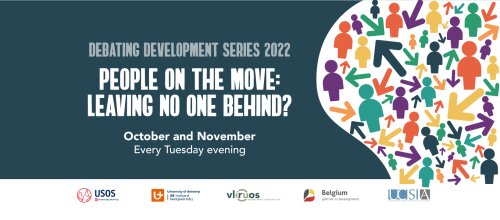
The 2030 Agenda for Sustainable Development recognizes the contribution of migration to sustainable development. Migration is a cross-cutting issue in the 2030 Agenda, with ten out of 17 goals containing targets and indicators directly relevant to migration or mobility. Despite the attention given to migration, and its inscription in promises of “leaving no one behind”, migration remains a contentious issue with rules for mobility that are selective and in function of national or regional interests.
In this series, we take a closer look at some of these contradictions. We explore how politics and understandings of migration are often inscribed in intentional discourses of ‘othering’ and dehumanization. We focus on the role that commodities play, such as cheap labor, talent (brain drain) and access to natural resources. We also discuss precarity and deep asymmetries among people who are denied mobility and are vulnerable to illegality, incarceration and to climate change.
Schedule academic year 2022-23
- Understandings of migration - opening session (Tuesday 4 October) 🎞️ Rewatch this debate (only UAntwerpen staff/students)
- Nando Sigona, Chair of International Migration and Forced Displacement - University of Birmingham
- Thomas Willekens, Policy officer Vluchtelingenwerk Vlaanderen
- Amal Miri,
postdoctoral researcher at the Centre for Migration and Intercultural Studies
- The war on drugs and migration: North-south dynamics & contesting stigmatization (Tuesday 11 October) 🎞️ Rewatch this debate
- Ruby Sanders, researcher and journalist at conSentido & MO* Magazine
- Itayosara Rojas, PhD Researcher at the International Institute of Social Studies (ISS), Erasmus University Rotterdam
- Charlotte de Kock, researcher at the Faculty of Law and Criminology of UGent.
- Juan Sebastian Velez Triana, PhD researcher and academic assistant at the Institute of Development Policy
- Refugees and host population dynamics: the politics of local integration (Tuesday 18 October) 🎞️ Rewatch this webinar - passcode: 2hEanM!m
- Lucy Hovil, Senior Research Associate and Tutor at the Refugee Law Initiative, University of London
- Cory Rodgers, Senior Research Fellow at the Refugee Studies Centre, University of Oxford
- Sarah Vancluysen, Post-Doctoral Researcher at the Institute of Development Policy
- Is Emigration from Poorer to Wealthier Countries Harmful to Those Left Behind? (Tuesday 8 November) 🎞️ Rewatch this debate
- Frederic Docquier, Research Program Leader at the Luxembourg Institute of Socio-Economic Research (LISER)
- Gunjan Sondhi, Lecturer in Geography, Faculty of Arts & Social Sciences, The Open University
- Stephanie Garcidueñas Nieto, PhD researcher and academic assistant at the Institute of Development Policy
- Incarceration of migrants (Tuesday 15 November) 🎞️ Rewatch this debate (only UAntwerpen staff/students)
- Alice Gerlach, Lecturer in Criminology, in the School of History, Philosophy and Culture at Oxford Brookes University
- Catherine Woollard, Director, European Council on Refugees and Exiles (ECRE)
- Denis Augustin Samnick, PhD researcher and academic assistant at the Institute of Development Policy
- Migration and climate justice (Tuesday 22 November) 🎞️ Rewatch this debate (only UAntwerpen staff/students)
- François Gemenne, senior researcher at The Hugo Observatory, Liège University
- Alberto Ares, director of Jesuit Refugee Service Europe
- Stephanie Collingwood Williams, social worker and climate activist
- Lore Van Praag, senior researcher at the Centre for Migration and Intercultural Studies
- Displacement of indigenous communities (Tuesday 29 November) 🎞️ Rewatch this debate (only UAntwerpen staff/students)
- Anexa B. Alfred-Cunningham, Lawyer and Expert in Human Rights and Indigenous Peoples
- Mary Ann Manahan, Conflict Research Group, Ghent University
- Alder Contreras Hernández , PhD researcher and academic assistant at the Institute of Development Policy